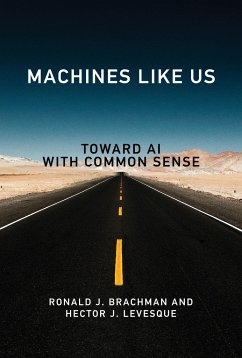How we can create artificial intelligence with broad, robust common sense rather than narrow, specialized expertise.
It s sometime in the not-so-distant future, and you send your fully autonomous self-driving car to the store to pick up your grocery order. The car is endowed with as much capability as an artificial intelligence agent can have, programmed to drive better than you do. But when the car encounters a traffic light stuck on red, it just sits there indefinitely. Its obstacle-avoidance, lane-following, and route-calculation capacities are all irrelevant; it fails to act because it lacks the common sense of a human driver, who would quickly figure out what s happening and find a workaround. In Machines like Us, Ron Brachman and Hector Levesque both leading experts in AI consider what it would take to create machines with common sense rather than just the specialized expertise of today s AI systems.
Using the stuck traffic light and other relatable examples, Brachman and Levesque offer an accessible account of how common sense might be built into a machine. They analyze common sense in humans, explain how AI over the years has focused mainly on expertise, and suggest ways to endow an AI system with both common sense and effective reasoning. Finally, they consider the critical issue of how we can trust an autonomous machine to make decisions, identifying two fundamental requirements for trustworthy autonomous AI systems: having reasons for doing what they do, and being able to accept advice. Both in the end are dependent on having common sense.
It s sometime in the not-so-distant future, and you send your fully autonomous self-driving car to the store to pick up your grocery order. The car is endowed with as much capability as an artificial intelligence agent can have, programmed to drive better than you do. But when the car encounters a traffic light stuck on red, it just sits there indefinitely. Its obstacle-avoidance, lane-following, and route-calculation capacities are all irrelevant; it fails to act because it lacks the common sense of a human driver, who would quickly figure out what s happening and find a workaround. In Machines like Us, Ron Brachman and Hector Levesque both leading experts in AI consider what it would take to create machines with common sense rather than just the specialized expertise of today s AI systems.
Using the stuck traffic light and other relatable examples, Brachman and Levesque offer an accessible account of how common sense might be built into a machine. They analyze common sense in humans, explain how AI over the years has focused mainly on expertise, and suggest ways to endow an AI system with both common sense and effective reasoning. Finally, they consider the critical issue of how we can trust an autonomous machine to make decisions, identifying two fundamental requirements for trustworthy autonomous AI systems: having reasons for doing what they do, and being able to accept advice. Both in the end are dependent on having common sense.
"Machines Like Us, for those who want to better understand a key part of intelligence we still haven t been able to clarify and build for artificial intelligence, is an excellent overview.
Forbes
"Machines Like Us provides a fresh perspective on potential areas of research, courtesy of two scientists who have been deeply involved in artificial intelligence since the 1970s."
Ben Dickson, TechTalks
In Machines like Us, Brachman and Levesque imagine a world where proactive explainability and trust are at the forefront of any AI system, arguing that programming commonsense knowledge and reasoning into AI is imperative. Without the ability to react to the unexpected, AI systems can not only prove futile in critical moments but also present major risks to human safety.
TechTarget
Forbes
"Machines Like Us provides a fresh perspective on potential areas of research, courtesy of two scientists who have been deeply involved in artificial intelligence since the 1970s."
Ben Dickson, TechTalks
In Machines like Us, Brachman and Levesque imagine a world where proactive explainability and trust are at the forefront of any AI system, arguing that programming commonsense knowledge and reasoning into AI is imperative. Without the ability to react to the unexpected, AI systems can not only prove futile in critical moments but also present major risks to human safety.
TechTarget
"Machines Like Us, for those who want to better understand a key part of intelligence we still haven t been able to clarify and build for artificial intelligence, is an excellent overview.
Forbes
"Machines Like Us provides a fresh perspective on potential areas of research, courtesy of two scientists who have been deeply involved in artificial intelligence since the 1970s."
Ben Dickson, TechTalks
In Machines like Us, Brachman and Levesque imagine a world where proactive explainability and trust are at the forefront of any AI system, arguing that programming commonsense knowledge and reasoning into AI is imperative. Without the ability to react to the unexpected, AI systems can not only prove futile in critical moments but also present major risks to human safety.
TechTarget
Forbes
"Machines Like Us provides a fresh perspective on potential areas of research, courtesy of two scientists who have been deeply involved in artificial intelligence since the 1970s."
Ben Dickson, TechTalks
In Machines like Us, Brachman and Levesque imagine a world where proactive explainability and trust are at the forefront of any AI system, arguing that programming commonsense knowledge and reasoning into AI is imperative. Without the ability to react to the unexpected, AI systems can not only prove futile in critical moments but also present major risks to human safety.
TechTarget

